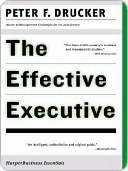The effective executive encourages opinions. But he insists that the people who voice them also think through what it is that the “experiment”—that is, the testing of the opinion against reality—would have to show. The effective executive, therefore, asks: “What do we have to know to test the validity of this hypothesis?” “What would the facts have to be to make this opinion tenable?” And he makes it a habit—in himself and in the people with whom he works—to think through and spell out what needs to be looked at, studied, and tested. He insists that people who voice an opinion also take
...more
Same idea as Snowden ccomplexity exploration: Multiple parallel safe-to-fail experiments that either get amplified or quashed based on some pre-defined indicator of early success or lack thereof.
Taking the falsification approach of his fellow Austrian Karl Popper: you can have all the hypotheses you want--and they'll all be emotionally driven to one extent or another. What's important is that they be testable and falsifyable.


